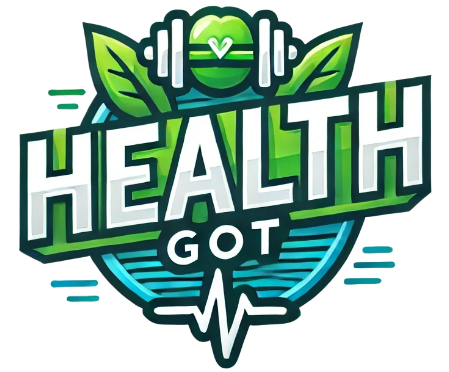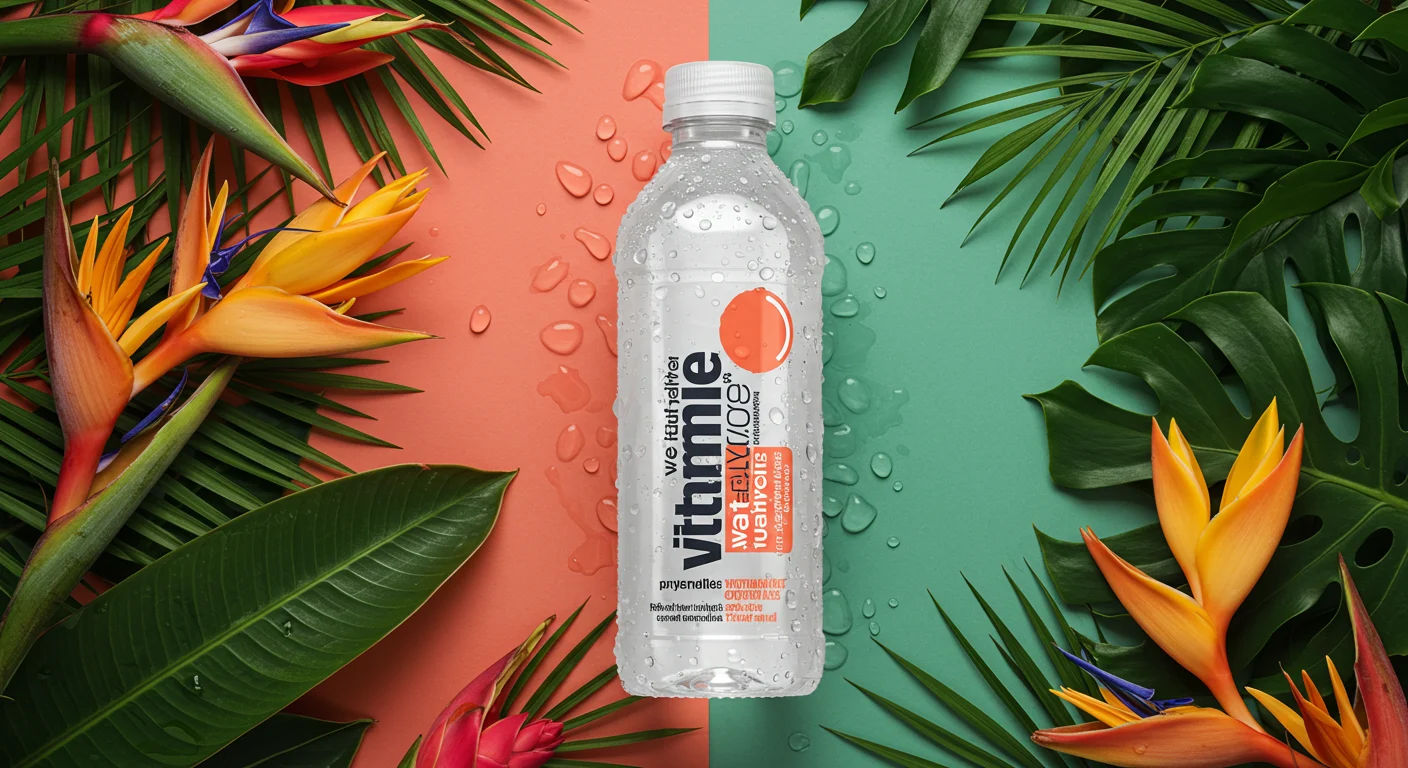Table of Contents
Vitamin Water has become a popular choice for people seeking hydration with a splash of added nutrients. Whether you’re fueling your fitness routine, looking for alternative hydration options, or just curious about the claims behind this colorful drink, this guide has everything you need to know.
We’ve covered every angle, from the nutritional value to DIY recipes, and answered some of the most pressing questions about vitamin water. Let’s explore it all!
Introduction
What Is Vitamin Water?
is a type of flavored, bottled water enriched with vitamins and minerals. It’s marketed as a functional drink that not only hydrates but also provides added nutrients that may benefit your overall well-being. These beverages often come in a variety of flavors, appealing both aesthetically and taste-wise.
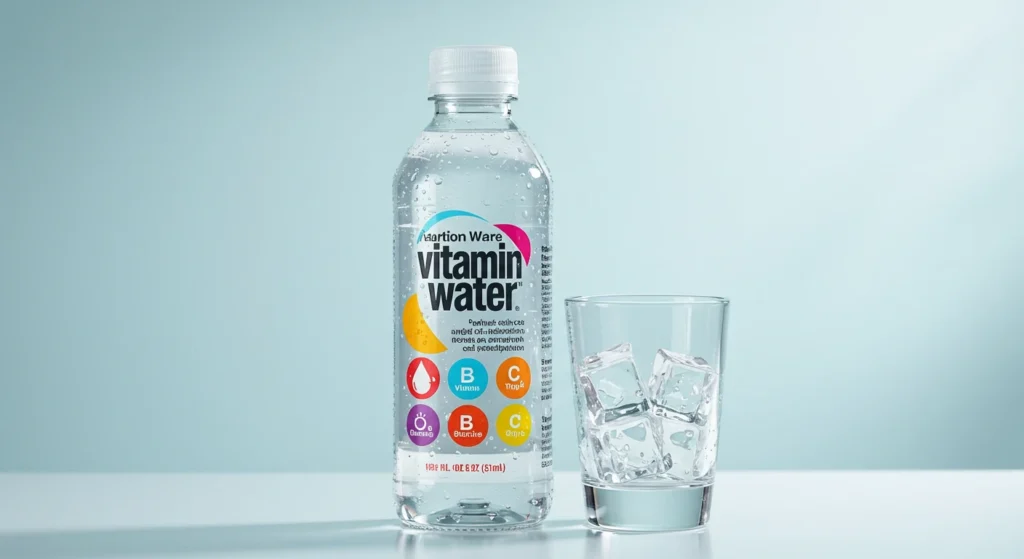
A Brief History and Origin
The concept was born out of a desire to merge hydration with nutritional supplements. Brands like Glacéau popularized the product in the early 2000s, with combinations of vitamins like B and C, minerals such as magnesium, and natural flavors becoming a hit among consumers.
Purpose and Intended Benefits
The main goal behind is to offer convenience. Instead of taking supplements alongside water, you can theoretically get a dose of nutrients while sipping a drink. It’s especially marketed to health-conscious individuals, athletes, and busy professionals looking for a quick nutrition boost.
Takeaway: aims to blend hydration with added health benefits in one convenient drink.
Nutritional Value of Vitamin Water
Before adding the vitamin to your diet, it’s important to understand what’s in the bottle. Here’s a breakdown.
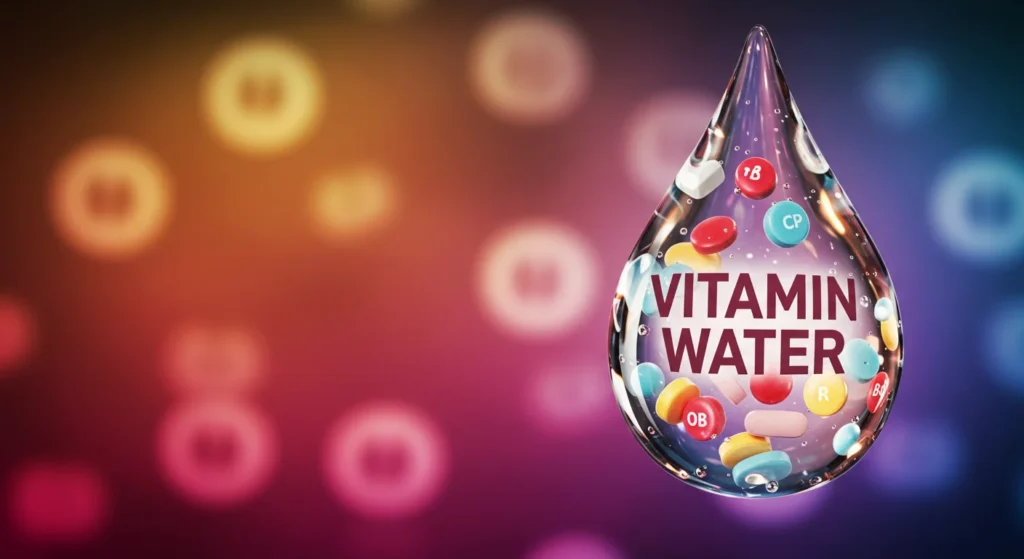
Key Vitamins and Minerals
Most products contain added:
- B Vitamins (e.g., B3, B6, and B12): Promote energy production and brain health.
- Vitamin C: Known for its immune-boosting properties and antioxidant benefits.
- Magnesium & Potassium (in select varieties): Key electrolytes for hydration and muscle function.
Comparison with Regular Water and Other Beverages
| Drink | Calories | Sugar | Nutrients |
|---|---|---|---|
| Regular Water | 0 | 0 | None |
| Vitamin Water | ~50-120 | ~13-26g | Vitamins B Vitamins C Magnesium Potassium |
| Sports Drinks | ~90-140 | ~22-30g | Sodium Potassium Sometimes sugar |
Regular water is calorie-free and has no additives. Sports drinks often contain electrolytes but are high in sugar.
Caloric Content and Sugar Levels
Sugar in vitamin water can be a point of contention. While some varieties are sweetened with stevia or erythritol (like Vitamin Water Zero), others can have up to 30g of sugar per bottle—almost as much as a soda. Reading labels is key when choosing a healthier option.
Takeaway: Balance nutrients and sweetness, but watch out for hidden sugars. Choose lower-calorie, sugar-free options for a healthier choice.
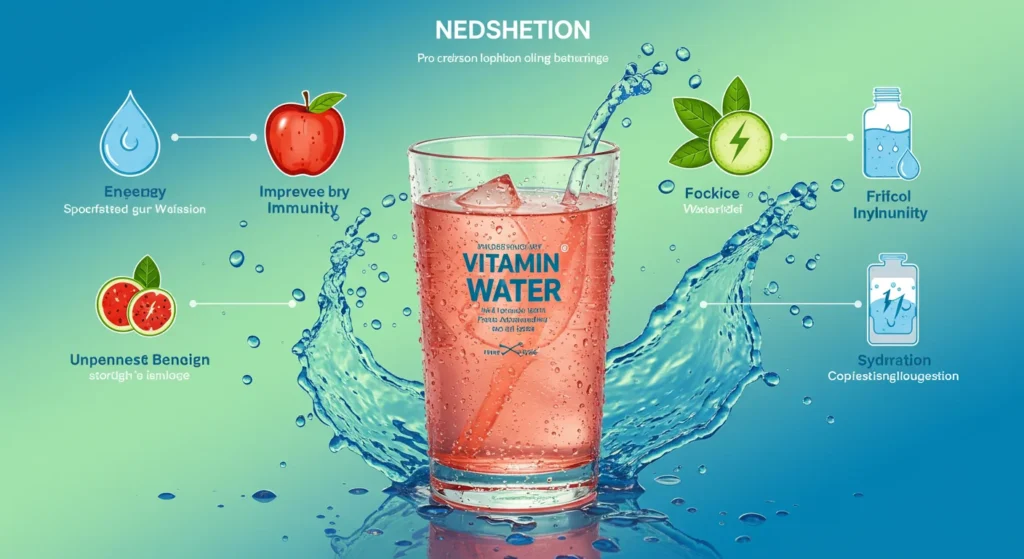
Types of the vitamin
Flavors and Formulations
comes in various flavors, catering to diverse taste preferences. Popular examples include:
- Focus (Kiwi-Strawberry): Contains vitamin A and lutein.
- Energy (Tropical Citrus): Packed with B vitamins and caffeine for a pick-me-up.
- Essential (Orange-Orange): High in vitamin C for immunity.
Health Benefits by Type
Each flavor is typically designed for a specific purpose:
- Electrolyte-rich versions help with hydration after workouts.
- Antioxidant-rich varieties support general wellness.
- Low-calorie formulations, like Zero sugar, are great for calorie-conscious consumers.
Brand Variations
While Glaceau Vitaminwater is a market leader, other companies produce their take on vitamin-enhanced beverages. Brands differ in ingredient quality, sugar content, and additional benefits like probiotics or protein boosters.
Takeaway: There are plenty of options available to suit different flavors, functions, and lifestyle needs.
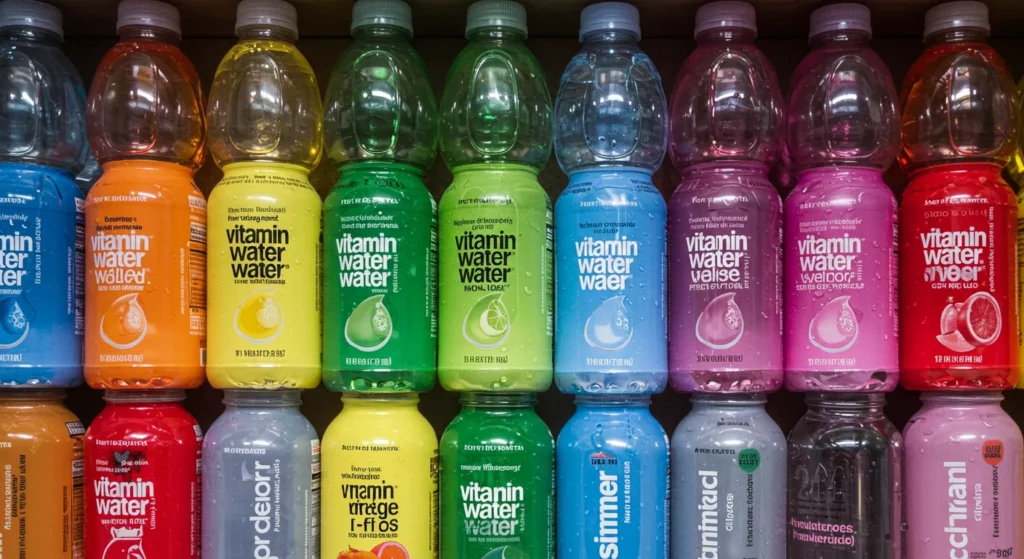
Health Benefits
Hydration
Flavored drinks offer a tastier alternative to plain water, making it easier for those who dislike plain water to stay hydrated.
Powerful Nutrients
Key vitamins like B and C support metabolism, immunity, and energy levels. For example:
- Vitamin C can help fight fatigue.
- Electrolytes, when present, aid muscle recovery and hydration.
Exercise Recovery
For light or moderate workouts, electrolyte-enhanced drinks help replenish fluids and nutrients. However, for intense exercise, a true sports drink might be a better option.
Takeaway: Hydration drinks can support fluid balance and provide small boosts of specific nutrients, but they’re not a cure-all.
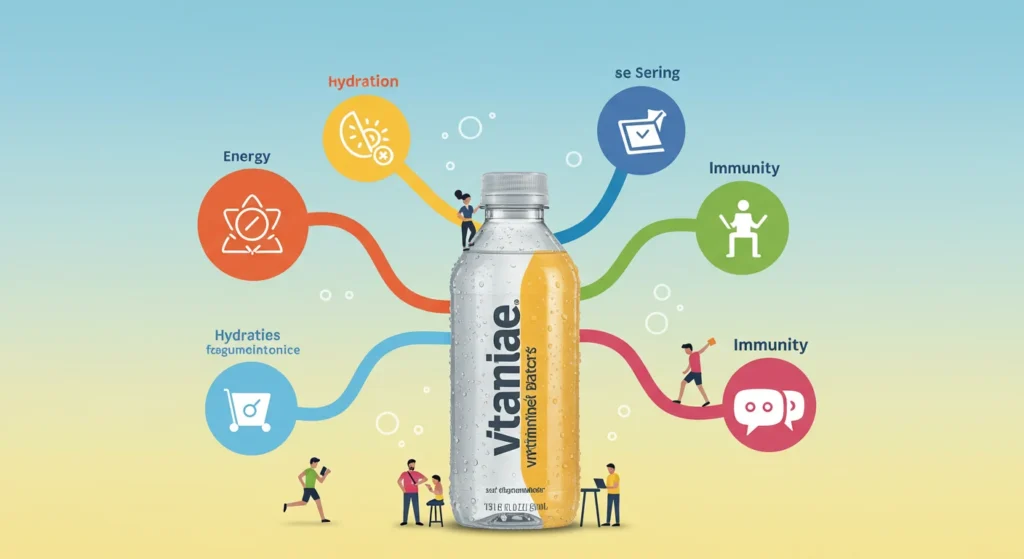
Is Vitamin Water Good for You?
This is one of the most commonly asked questions, and understandably so. The answer really depends on your lifestyle, your personal habits, and how you consume it. For instance, some people may find it fits easily into their daily routine, while others may need to make adjustments to accommodate it. Factors like frequency, timing, and even the way you incorporate it into your schedule can all play a role in determining the best approach for you.
The Good
- Convenient source of vitamins for those who might not get enough from their diet.
- Tasty hydration that encourages more water intake.
- Low calorie options are available for those looking to watch their sugar intake.
- Variety of flavours makes it more appealing than plain water, catering to diverse tastes.
- Fortified options can fill minor nutritional gaps if consumed in moderation.
- Portable and easy to access, making it a practical choice for busy individuals on the go.
The Bad
- High sugar varieties can contribute to weight gain or spikes in blood sugar levels.
- Not a substitute for a balanced diet; it should complement, not replace, whole foods.
- Some variants contain artificial sweeteners, which may not be suitable for everyone and could have potential side effects.
- Overconsumption of fortified vitamins may lead to excess nutrient intake, which can be harmful to health.
- Environmental impact due to plastic bottles; opting for reusable bottles or recycling is essential.
- Often marketed as a health product, but not all vitamin water types align with a truly healthy lifestyle.
Takeaway: Vitamin water is good in moderation, as it fills gaps in nutrients and hydrates, but it shouldn’t replace water or nutrient-dense foods.
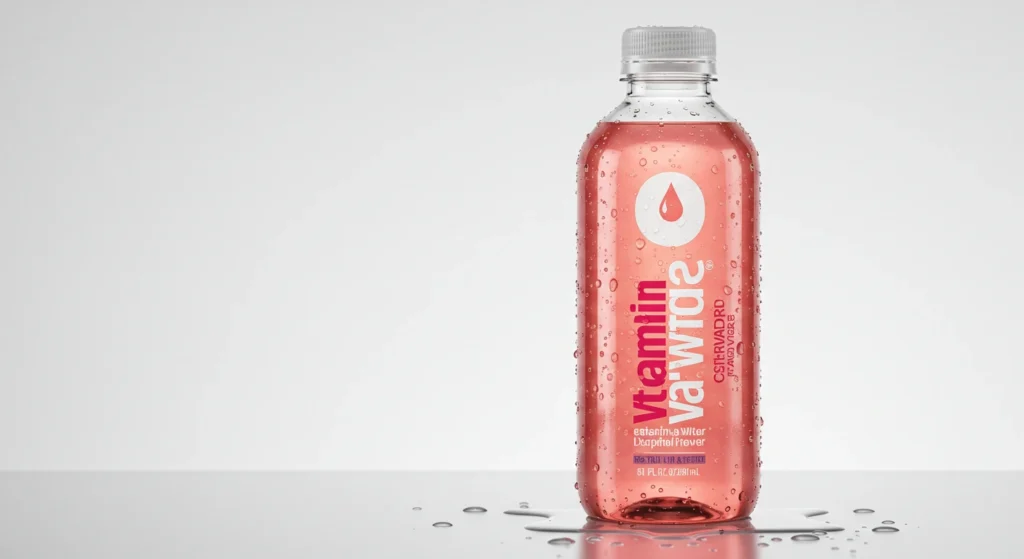
Does Vitamin Water Have Electrolytes?
Yes, most vitamin waters do have electrolytes like potassium or magnesium, though the amount varies. Electrolytes are crucial during exercise or hot weather to replenish lost minerals from sweat. However, if you’re after serious replenishment (like after a marathon), other hydration-focused drinks may meet your needs better.
Takeaway: Yes, vitamin water has electrolytes, but it’s not always sufficient for high-intensity activities.
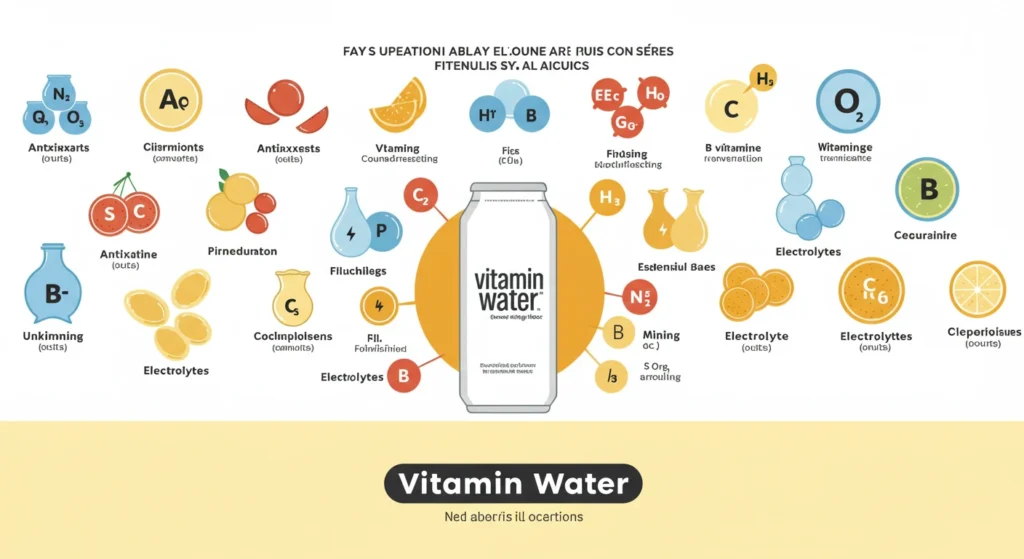
Potential Drawbacks of Vitamin Water
While vitamin water has its perks, there are downsides to keep in mind.
- Sugar Overload: A single bottle can pack as much sugar as a candy bar. Opt for Vitamin Water Zero to avoid added sugars.
- Health Misconceptions: Some assume vitamin water is a “super drink,” but it won’t replace a healthy diet or routine water intake.
- Not for Sedentary Lifestyles: The added calories might contribute negatively if you’re not active.
Takeaway: Vitamin water isn’t always the health drink it seems. Label reading is essential.
DIY Vitamin Water Recipes
Making vitamin water at home allows you to skip added sugars and customize flavors. Here’s how to make your own:
Example Recipe 1: Citrus Energy Booster
- Ingredients: Orange slices, lemon slices, fresh mint, and water.
- Directions: Add all ingredients to a jar, refrigerate, and enjoy after at least 4 hours.
Example Recipe 2: Antioxidant Power
- Ingredients: Frozen berries (blueberries, raspberries), a slice of fresh ginger, and a sprig of rosemary.
- Directions: Combine ingredients in water and steep overnight.
Takeaway: Homemade vitamin water is natural, sugar-free, and just as flavorful!
Comparing Vitamin Water to Other Beverages
When considering vitamin water, it’s helpful to compare it to other popular hydration and energy options. Here’s how it stacks up:
Vitamin Water vs. Sports Drinks
- Vitamin Water: Contains added vitamins and often fewer electrolytes, making it suitable for light to moderate activity.
- Sports Drinks: Specifically formulated for intense physical exertion, with higher levels of electrolytes and carbohydrates for energy replenishment.
Vitamin Water vs. Plain Water
- Vitamin Water: Adds flavor, which can encourage hydration in those who dislike plain water, and provides some added nutrients.
- Plain Water: Zero calories, no additives, and the purest form of hydration. Ideal for everyday consumption.
Vitamin Water vs. Sugary Sodas
- Vitamin Water: A healthier alternative with fewer additives and more nutrients, especially when opting for low-sugar versions.
- Sugary Sodas: High in sugar and empty calories, providing no additional benefits besides taste.
Takeaway: The best choice depends on your activity level, health goals, and hydration preferences.
Is Vitamin Water Safe for Daily Consumption?
Most people can consume fortified beverages or supplements daily in moderation, but it’s important to watch the type and amount. Drinks with added sugars or artificial sweeteners may not be ideal for regular use, especially for those managing diabetes or reducing calorie intake. Relying too much on these drinks can also cause nutrient imbalances, as excess vitamins may lead to toxicity.
For those with specific needs, like athletes or people recovering from illness, they can be a useful supplement but shouldn’t replace whole foods. If you’re unsure, consult your healthcare provider.
Takeaway: Fortified beverages can be safe for daily consumption when chosen carefully and consumed in moderation. Balance is key.
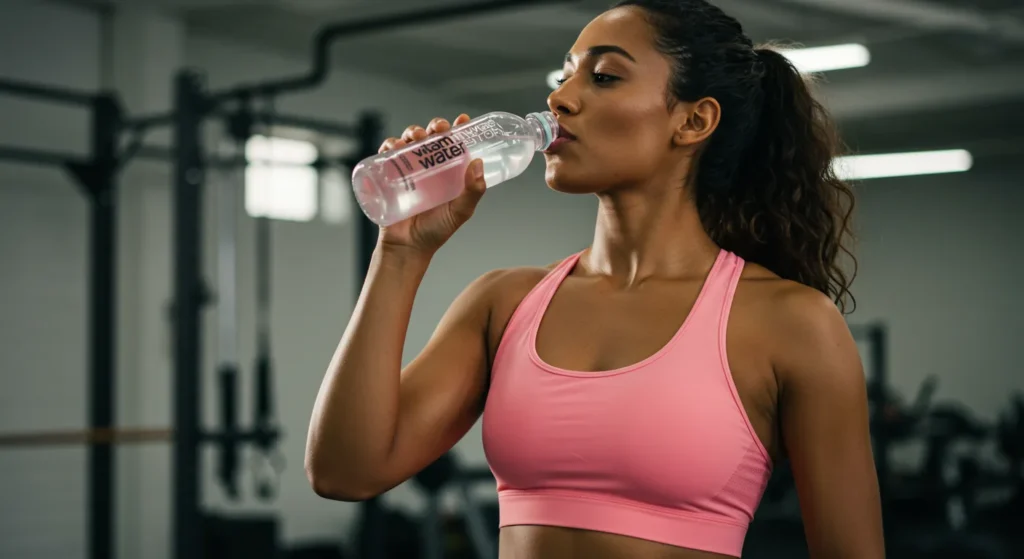
Sustainable Hydration Alternatives
Staying hydrated doesn’t have to come at the expense of the environment. There are plenty of eco-friendly options that help reduce plastic waste and lower your carbon footprint while keeping you nourished.
Reusable Infusion Bottles
Invest in a reusable water bottle with an infusion compartment. These bottles allow you to add fresh fruits, herbs, or vegetables to your water, creating personalised flavours without the need for disposable plastic bottles.
Homemade Herbal Teas
Herbal teas can be brewed and consumed cold, offering a range of flavours and potential health benefits. Ingredients like chamomile, hibiscus, and green tea can deliver natural vitamins and antioxidants without any added sugars or preservatives.
Local Options
Seek out locally made beverages that use eco-friendly packaging. Many smaller brands focus on sustainability by using glass or biodegradable materials for their products. Supporting these options reduces the environmental impact of long-distance transportation.
Takeaway: By choosing homemade or sustainable alternatives, you can enjoy flavourful hydration while supporting eco-friendly practices.
The Marketing of Enhanced Beverages
Enhanced beverages are growing in popularity, marketed as healthier, more vibrant alternatives to soft drinks. Brands emphasize added nutrients, stylish packaging, and messaging that ties the drinks to energy, fitness, and wellness. This has led many to see them as better hydration options, despite concerns about added sugars or artificial ingredients in some varieties.
Ads often target younger, active audiences, promoting these drinks as a convenient choice for busy, health-conscious lifestyles. While the marketing is convincing, consumers should check labels to ensure the claims match their health goals.
Takeaway: Marketing can be persuasive, but informed choices come from understanding what’s inside, not just what’s advertised.
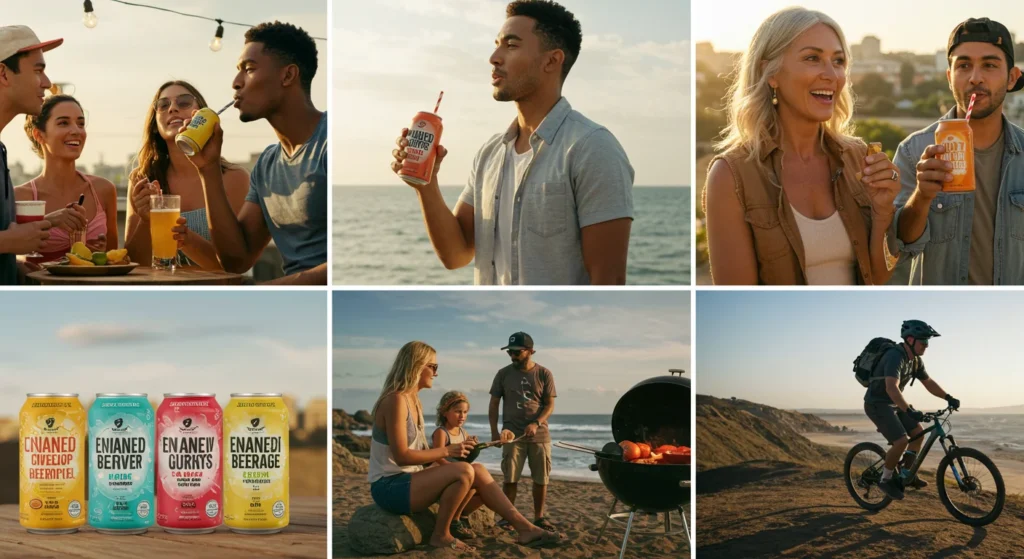
Reading Labels on Beverages
Watch Out for Added Sugars
Many beverages marketed as healthy options may contain added sugars, which can significantly increase your daily calorie intake without you realizing it. Consuming too much sugar can lead to negative health effects, such as weight gain, blood sugar spikes, and an increased risk of conditions like type 2 diabetes. To make smarter choices, always check the nutrition label for sugar content and opt for low-sugar or sugar-free options. Better yet, consider making your own infused water with fresh fruits and herbs for a flavorful, nutrient-rich drink without any added sugars.
Be Cautious with Artificial Ingredients and Nutrient Levels
Some drinks include artificial sweeteners or flavorings, which some people prefer to avoid due to health concerns or personal preferences. These additives can sometimes overshadow the perceived benefits of the product. Additionally, it’s important to examine the types and amounts of nutrients listed on the label. While these beverages can supplement your daily intake, consuming excessive levels of certain vitamins or minerals, especially when combined with a nutrient-rich diet, could lead to overconsumption and potential health risks, such as toxicity or imbalances. Always consider your overall dietary intake when incorporating these drinks into your routine.
Choose Natural and Minimal Additives
For the best option, look for labels that highlight natural ingredients and minimal additives, as these tend to be healthier and less processed. Pay attention to terms like “organic,” “non-GMO,” or “no artificial flavors,” which can indicate higher quality. Understanding the nutritional information, such as calorie count, sugar levels, and fat content, helps you pick a product that aligns with your health goals and dietary preferences. Additionally, checking for allergens or specific dietary certifications, like gluten-free or vegan, can ensure the beverage meets your needs. Taking a little extra time to read labels can make a big difference in choosing the right option for your lifestyle.
Takeaway: Always read beverage labels carefully to avoid hidden sugars and ensure it fits your nutritional needs.
The Role of Vitamin Water in Hydration
The Importance of Hydration
Hydration is essential for maintaining overall health. While plain water is the gold standard for its purity and lack of calories, some people turn to vitamin water for added flavor and potential nutritional benefits.
What is Vitamin Water?
Vitamin water is marketed as a way to combine hydration with vitamins and minerals. It offers an alternative for those who prefer flavored beverages but still want to stay hydrated.
Should Vitamin Water Replace Regular Water?
Although vitamin water contributes to your daily fluid intake, it shouldn’t replace plain water entirely. Many varieties contain added sugars or sweeteners, which can impact their suitability for regular consumption.
Who Can Benefit from Vitamin Water?
For athletes or individuals with active lifestyles, some types of vitamin water are designed to provide additional benefits, such as electrolytes for rehydration after intense exercise.
A Balanced Approach to Hydration
For most people, a mix of plain water and natural options like infused water, herbal teas, or fresh juices is a healthier and more economical choice. Striking a balance helps meet hydration needs without unnecessary additives or excessive nutrients.
Takeaway
Vitamin water can complement hydration but shouldn’t replace regular water. Choose options that align with your health and lifestyle for overall well-being.
FAQs About Vitamin Water
1. Are There Any Side Effects of Drinking Vitamin Water?
Consuming high-sugar versions of foods or beverages frequently can have negative health effects, including weight gain due to the extra calories and a higher risk of blood sugar spikes, particularly for individuals with diabetes. Over time, these spikes in blood sugar can lead to complications, such as increased insulin resistance or other metabolic issues, highlighting the importance of choosing lower-sugar alternatives whenever possible..
2. Can Vitamin Water Replace Regular Water?
No. While it does provide hydration, the added ingredients and supplements mean it’s better suited as a complement to regular water rather than a full substitute. For optimal health, plain water should remain your primary source of hydration.
3. Is Vitamin Water Suitable for Children?
Only low-sugar or zero-sugar options should be given to children occasionally, as regular consumption of sugary products can lead to various health issues, including tooth decay, weight gain, and an increased risk of developing long-term health problems like diabetes. It’s important to prioritize healthier alternatives and limit sugary treats to special occasions to support their overall well-being.
4. How Often Should You Drink Vitamin Water?
Consuming something once or twice a day is generally fine, but it depends on factors like the sugar content of the food or drink and your activity level. For example, if the sugar content is high, it’s better to limit consumption, especially if you’re not very active. On the other hand, if you lead a physically demanding lifestyle, your body might tolerate or even benefit from the extra energy. Always aim for balance and moderation.
Takeaway: Understand your goals and read labels before consuming vitamin water regularly.
5. Can Vitamin Water Help with Weight Loss?
While some vitamin water products are marketed as low-calorie or sugar-free, they should not be relied upon solely for weight loss. They can be a part of a balanced diet, but prioritising water, healthy food, and exercise is essential for effective weight management.
6. Does Vitamin Water Contain Artificial Sweeteners?
Some versions of vitamin water, especially zero-sugar options, may include artificial sweeteners. While these can reduce calorie content, it’s worth checking the label and researching the potential effects of specific sweeteners on your health.
7. Is Vitamin Water a Good Source of Daily Vitamins?
Vitamin water can provide certain vitamins, but it shouldn’t be your primary source. Whole foods like fruits, vegetables, and proteins offer a more comprehensive and natural supply of nutrients without added sugars or additives.
8. Can Athletes Benefit from Vitamin Water?
Athletes may find vitamin water helpful for quick hydration and replenishment of certain vitamins lost during intense activity. However, sports drinks specifically formulated for electrolytes might be more effective for prolonged physical exertion.
9. Are All Vitamin Waters the Same?
Not all vitamin water brands and products are identical. They vary significantly in terms of sugar content, calorie count, and vitamin additions. Always compare brands and read labels to ensure you choose one that aligns with your health goals.
Conclusion
Vitamin water offers a tasty, convenient way to hydrate and supplement certain nutrients, making it a popular choice for busy individuals and fitness enthusiasts. However, it’s important to weigh the pros and cons, like its sugar content and health claims.
Key Tips for Vitamin Water Fans:
- Opt for Vitamin Water Zero to avoid unnecessary sugars.
- Use it as a supplement, not a replacement for water or food.
- Try making your own at home for a healthier alternative.
- Stay aware of portion sizes, as overconsumption can contribute to excess calorie and sugar intake.
- Pair vitamin water with a balanced diet to ensure you’re meeting all your nutritional needs.
- Look for brands that clearly label ingredients and avoid artificial additives.
- Consider your personal health objectives, such as weight management or specific vitamin deficiencies, before incorporating vitamin water into your routine.
- Always check the expiration date to ensure freshness and nutritional integrity.
Remember, hydration is essential, whether it’s plain water or a flavorful twist. By being mindful, you can enjoy vitamin water as part of a balanced lifestyle!
Recourse
Here are 10 suggested resources with links to explore further information or learn more:
- National Geographic – Offers articles, videos, and photos on nature, science, and culture.
- BBC Earth – Explore incredible documentaries and stories about the natural world.
- TED Talks – A platform with inspiring talks on various topics, including science and creativity.
- NASA Official Website – Information about space exploration, science, and discoveries.
- Smithsonian Institution – A resource for history, science, art, and cultural achievements.
- Coursera – An education platform for online courses on a wide range of subjects.
- Khan Academy – Free educational resources for learners of all ages.
- The Climate Reality Project – Information and initiatives focused on fighting climate change.
- Australian Bureau of Statistics – Reliable data and statistics about Australia.
- World Health Organization (WHO) – Essential health-related facts and global health insights.
